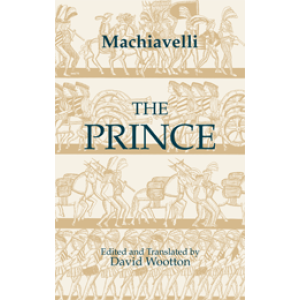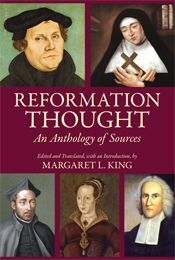Renaissance Humanism
"By far the best collection of sources to introduce readers to Renaissance humanism in all its many guises. What distinguishes this stimulating and useful anthology is the vision behind it: King shows that Renaissance thinkers had a lot to say, not only about the ancient world—one of their habitual passions—but also about the self, how civic experience was configured, the arts, the roles and contributions of women, the new science, the 'new' world, and so much more."
—Christopher S. Celenza, Johns Hopkins University
Read Margaret King's post, Teaching the Reformation in a Secular Age, on The Hackett Colloquim blog.
eBook edition available for $16.95. Click HERE for more information.
- Read Margaret King's post, Teaching the Reformation in a Secular Age, on The Hackett Colloquim blog.
- The complete Table of Contents for Renaissance Humanism is available at the bottom of this page.
"By far the best collection of sources to introduce readers to Renaissance humanism in all its many guises. What distinguishes this stimulating and useful anthology is the vision behind it: King shows that Renaissance thinkers had a lot to say, not only about the ancient world—one of their habitual passions—but also about the self, how civic experience was configured, the arts, the roles and contributions of women, the new science, the 'new' world, and so much more."
—Christopher S. Celenza, Johns Hopkins University
"King is a distinguished scholar whose talents as an editor, translator, and interpreter of the Renaissance are well represented in this book. With a balanced variety of texts (most newly translated) introduced and commented on by King, this anthology far surpasses others in the field.…
"[T]his excellent anthology will remain a valuable textual resource for many years to come."
—Alan Perreiah, in The Sixteenth Century Journal
"Through thirty-nine judiciously chosen texts spanning the 1350s to the 1650s, Margaret King introduces students to humanism as a cultural toolkit devised, applied, appropriated, and sometimes reworked or challenged by diverse historical protagonists. The humanists whom readers encounter here include men and women, elites and commoners. And while most writers who King incorporates lived and worked in European localities, a few examples take the reader to Latin America and East Asia.
"King consistently proves a masterly and engaging guide for readers new to the subject of humanism, but without (to my mind) closing down possibilities for discussion. And that guidance includes pithy grounding in relevant historiographical debates, especially concerning the meanings and varieties of humanism, its reconcilability with religion, and its fraught relationship to science, without delving into too much minutiae.
"The translations, many of them King’s, offer readers lively renderings. . . . readers should find the representativeness and diversity of the materials satisfying.
"Renaissance Humanism [will] enhance undergraduate electives and seminars on the Renaissance. The volume’s chronological and topical sweep, moreover, and its relative affordability make it appropriate for inclusion in broader surveys of early modern European history as well."
—Renaissance Quarterly
“A welcome addition to the relatively modest ranks of source surveys in English for Renaissance intellectual history. [King’s] anthology offers a broader range of authors and themes than its similarly conceived predecessors. . . The volume benefits from King’s deployment of an expansive and flexible definition of humanism. Her selections demonstrate the ubiquity of humanism and the degree to which it was a lens used throughout Europe by men and women and aristocrats and artisans to understand virtually every major development in early modern history. For this reason, the book will serve well not only in Renaissance courses but in survey courses on early modern history conceived at the broadest level.
"King’s anthology is the biggest and broadest—and therefore the best—introduction to Renaissance humanism currently available and is surely destined for long life in university classrooms.”
—Renaissance and Reformation
About the Author:
Margaret L. King is Professor of History, Emerita, Brooklyn College and the Graduate Center, CUNY. She is the recipient of The Renaissance Society of America’s 2018 Paul Oskar Kristeller Lifetime Achievement Award.
General Introduction
Bibliographical Note
Chapter 1: Antiquity Reborn
Introduction
1. Francesco Petrarca (Petrarch)
Letter to Cicero (1345)
Letter to Homer (1360)
2. Giovanni Boccaccio
Genealogy of the Pagan Gods, Book XIV (1360/1374)
3. Pier Paolo Vergerio
On Liberal Studies and the Moral Education of the Free- Born Youth (c. 1402/1403)
4. Poggio Bracciolini and Cencio Romano, Book Hunters
Poggio Bracciolini, Letter to Guarino Veronese (1416)
Cencio Romano, Letter to Francesco da Fiano (1416)
Chapter 2: Explorations of the Self
Introduction
5. Petrarch
To Posterity (1351/1372)
6. Giannozzo Manetti
On the Dignity and Excellence of Man (1452/1453)
7. Giovanni Pico della Mirandola
Oration on the Dignity of Man (1486)
8. Michel de Montaigne
To the Reader (1580) and On Experience (1587-1588)
Chapter 3: The Civic Experience
Introduction
9. Leonardo Bruni
In Praise of the City of Florence (1404)
10. Francesco Barbaro
On Marriage (1415)
11. Alamanno Rinuccini
Dialogue on Liberty (1479)
12. Juan Luis Vives
On Assistance to the Poor (1526)
Chapter 4: A World in Crisis
Introduction
13. Lauro Quirini
Letter to Pope Nicholas V, on the Fall of Constantinople (1453)
14. Angelo Poliziano
Account of the Pazzi Conspiracy (1478)
15. Luigi Guicciardini
The Sack of Rome (1527)
16. Olympia Fulvia Morata
Letters (1551-1555)
Chapter 5: Machiavelli, Erasmus, and More: Visions of the State
Introduction
17. Niccolò Machiavelli
The Prince (1513)
19. Desiderius Erasmus
On the Education of a Christian Prince (1516)
19. Thomas More
Utopia (1516)
Chapter 6: Humanism and the Arts
Introduction
20. Leon Battista Alberti
On Painting (1435)
21. Isabella d'Este
Letters on Painters and Painting (1497-1506)
22. Albrecht Dürer
Letters to Willibald Pirckheimer (1506)
23. Benvenuto Cellini
Autobiography, Book II (1558/1566)
Chapter 7: Humanism and Religion
Introduction
24. Lorenzo Valla
On the Donation of Constantine (1440)
25. Jacques Lefèvre d'Étaples
Exhortatory Letter on Translating the Gospels into French (1523)
26. Bernardino Ochino
Dialogue about the Thief on the Cross (1540)
27. Gasparo Contarini et al.
Report on the Reform of the Church (1537)
Chapter 8: Humanism, Science, and Philosophy
Introduction
28. Marsilio Ficino
Letters (1473/1474)
29. Nicholas Copernicus
Preface to On the Revolutions of the Celestial Spheres (1543)
30. Galileo Galilei
Letter to the Grand Duchess Christina (1615)
31. René Descartes
Discourse on Method (1637)
Chapter 9: Women and Humanism
Introduction
32. Isotta Nogarola
Dialogue on the Equal or Unequal Sin of Adam and Eve (1451)
33. Laura Cereta
Letters to Bibolo Semproni (1488) and Lucilia Vernacula (1487)
34. Cassandra Fedele
Oration in Praise of Letters (c. 1487)
35. Marie Le Jars de Gournay
The Equality of Men and Women (1622)
Chapter 10: Other Worlds
Introduction
36. Amerigo Vespucci
New World, Letter to Lorenzo de' Medici, 1502/1503
37. Garcilaso de la Vega, "El Inca"
Royal Commentaries of the Incas (1609-1617)
38. Saint Francis Xavier
Letter to His Companions in Europe (1552)
39. Luís Vas de Camões
The Lusiads (1572)
Appendix: Texts and Studies
Index



















